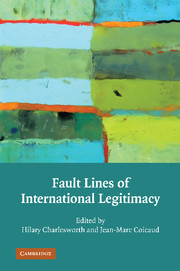Book contents
- Frontmatter
- Contents
- Acknowledgments
- Contributors
- Introduction
- PART I FROM THE HISTORY AND STRUCTURE OF INTERNATIONAL LEGITIMACY TO FAULT LINES IN CONTEMPORARY INTERNATIONAL POLITICS
- PART II THE UN SECURITY COUNCIL: EXPRESSION, VENUE, AND PROMOTER OF INTERNATIONAL LEGITIMACY?
- PART III LEGITIMACY OF INTERNATIONAL INTERVENTIONS AND HIERARCHY OF INTERNATIONAL RIGHTS
- PART IV IN SEARCH OF NEW FORMS OF INTERNATIONAL LEGITIMACY: BETWEEN POWER AND PRINCIPLES
- Conclusion: The Legitimacies of International Law
- Index
- References
Introduction
Published online by Cambridge University Press: 06 April 2010
- Frontmatter
- Contents
- Acknowledgments
- Contributors
- Introduction
- PART I FROM THE HISTORY AND STRUCTURE OF INTERNATIONAL LEGITIMACY TO FAULT LINES IN CONTEMPORARY INTERNATIONAL POLITICS
- PART II THE UN SECURITY COUNCIL: EXPRESSION, VENUE, AND PROMOTER OF INTERNATIONAL LEGITIMACY?
- PART III LEGITIMACY OF INTERNATIONAL INTERVENTIONS AND HIERARCHY OF INTERNATIONAL RIGHTS
- PART IV IN SEARCH OF NEW FORMS OF INTERNATIONAL LEGITIMACY: BETWEEN POWER AND PRINCIPLES
- Conclusion: The Legitimacies of International Law
- Index
- References
Summary
For Samir Kassir, in memoriam
The question of legitimacy has a paradoxical status in international relations. On the one hand, it is a feature of international life. Indeed, as far as a country tries to live in relative harmony with its neighbors, it has to factor in what is right and what is wrong internationally so that peace can be maintained. As such, issues of legitimacy (e.g., legitimate and illegitimate behavior) are part and parcel of international relations, and one of the tasks of international law – a key tool for the regulation of international affairs – is to draw a line between legitimacy and illegitimacy in international life. On the other hand, over time, questions of international legitimacy have received secondary attention. It is not surprising because the socialization of individuals have taken place historically first at the national level; it is at this level that legitimacy has been principally addressed. This has been particularly the case in the context of reflecting on whether the organization and functioning of society is just and, therefore, whether its political institutions and leaders are legitimate.
However, in the past twenty years, legitimacy at the international level has been the object of increased attention. The international redistribution of power resulting from the collapse of the Soviet Union; the possibility of and need for multilateral institutions (primarily the United Nations [UN]) to be more involved than in the past in the management of the international system; the use of democratic and human-rights values as benchmarks of legitimate and illegitimate behaviors internationally, especially in connection with the use of force are some of the factors that account for the emergence of legitimacy on the international scene.
- Type
- Chapter
- Information
- Fault Lines of International Legitimacy , pp. 1 - 14Publisher: Cambridge University PressPrint publication year: 2010



